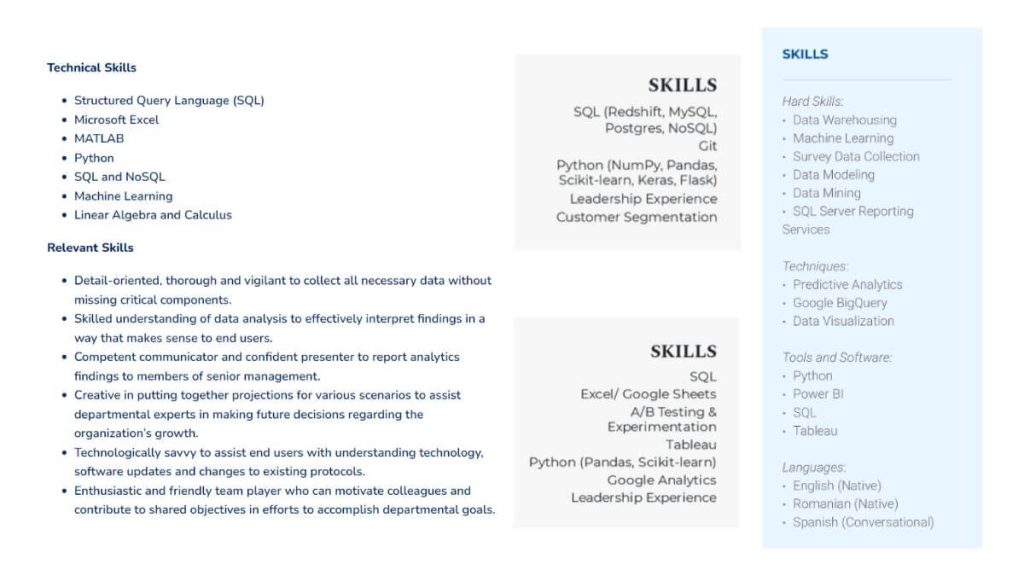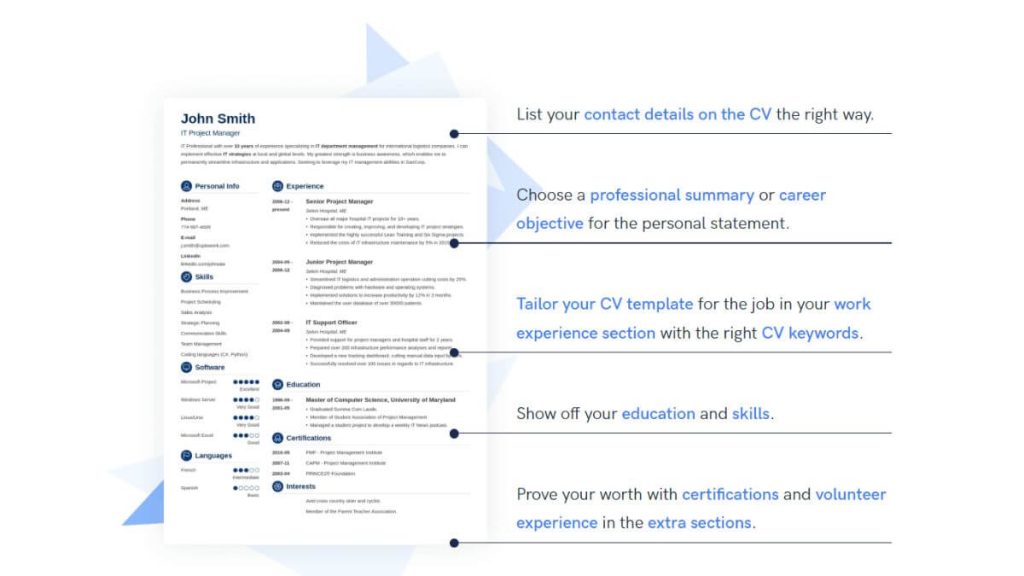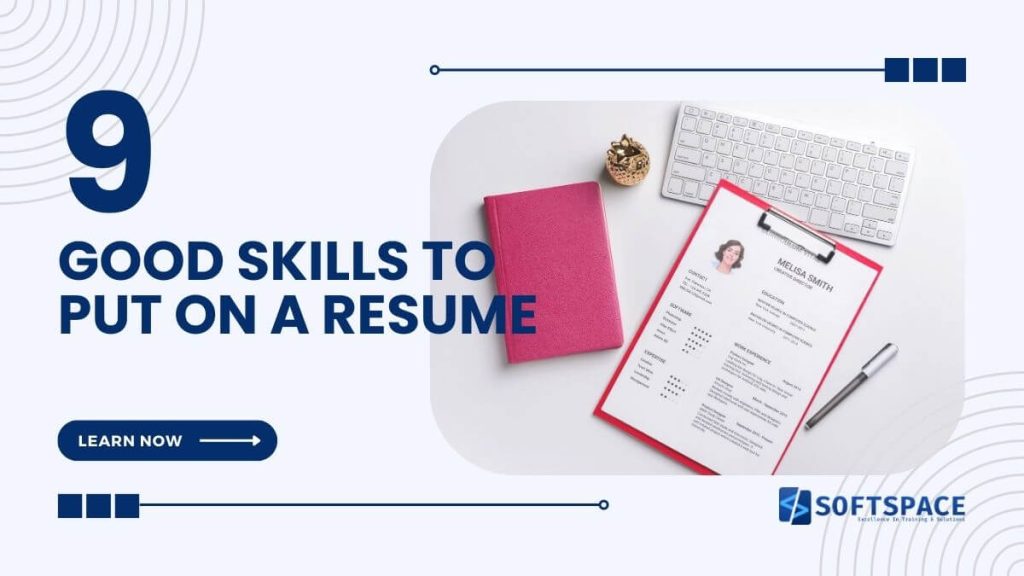Are you creating a professional Resume for yourself? I am sure you know how important that document is. It is your reflection on paper. As simple as that.
A well-crafted resume is a vital tool for any job seeker. When creating a resume, it is essential to focus on showcasing your skills to stand out from the competition. This blog post will tell you what good skills to put on a resume so that it gets highlighted and catches the eye of employers.
With so many different skills to choose from, it can be difficult to decide which ones to include in your resume. However, there are some good skills that will always come in handy. The best part is that if you have these skills, they’re easy to add to your resume! Here’s a list of the top nine:
Some good skills to put on a resume
Table of Contents
First & Foremost: Your Job Skills
These are the skills which define your profile and what you exactly are. These need to be highlighted precisely to catch the eye and get shortlisted in the first look. Your resume is going to get an eye for a maximum of 7.4 seconds. So, how to utilize those fully and grab the attention?
When it comes to listing your skills, be short and precise. Prioritize them for the role you are applying for. For example, you are a Data Analyst. So, what do you mention as an introduction of yours and how?

Secondly: General skills
These are some good skills to put on a resume. Why? Because they highlight your personality. Other than your job profile, what kind of person are you?
Communication skills
- Listening skills are essential to communication. If you have strong listening skills, it shows that you can take in and process information accurately.
- Speaking skills include public speaking and presentation skills, which are crucial for many jobs in business or sales.
- Interpersonal skills include empathy, perspective taking and conflict resolution–all of which help build rapport with others and make them feel more comfortable around you.
- Written communication includes typing speed as well as grammar usage on social media platforms such as Twitter or Facebook (which are often used by employers).
Time Management
Time management is an important skill to have, whether you’re a student or a professional. If you’re looking for a job, your resume will be one of the first things potential employers see.
As such, it’s important that your resume is well-crafted and highlights your best qualities as an employee or potential employee. Time management skills are one way in which you can show off how great of an employee you would be if given the opportunity by highlighting them on your resume.
Here’s what time management looks like on paper:
- You know how long tasks take before starting them so that there aren’t any surprises later on down the road (like having half of a project due tomorrow)
- You manage deadlines effectively so they don’t sneak up on anyone involved
Problem-Solving
Problem-solving is the ability to identify problems and find solutions. Problem-solving skills are useful in all aspects of life, but they’re especially important for jobs where you have to solve problems every day.
Some examples of problem-solving skills include:
- Identifying a problem
- Identifying possible solutions to that problem
- Evaluating the pros and cons of each solution (and choosing which one is best)
Ability to work under pressure
If you’re looking for a job, it’s highly likely that one of the skills you’ll want to include on your resume is the ability to work under pressure. This can be demonstrated in several ways:
- Demonstrating how well you’ve been able to perform in high-pressure situations in the past
- Showing how easily adaptable and flexible you are when faced with new challenges
- Providing examples of how well-organized and efficient you are at completing tasks while under pressure
Listening skills
Listening is a vital skill for any job, and it’s one that can be learned. You don’t have to be born with the ability to listen well–it’s something you can develop over time.
If you are having trouble listening effectively, try these tips:
- Listen more than you speak. When someone else is talking, focus on them instead of thinking about what your response will be or how much money you could make by getting another client in the door at this very moment (or whatever else may be distracting you).
- Don’t interrupt other people when they’re speaking; wait until they finish before asking questions or providing commentary about what was said. This will help ensure that everyone feels heard and understood by their peers–and there’s nothing more important than feeling heard!
Writing skills
Writing skills are important for any job that requires communicating with others. If you’re applying for a job where writing is part of your daily duties, it’s likely that the employer will want to see some examples of your work in their resume or cover letter.
Writing skills can also be beneficial if you plan on going into business for yourself someday, as many entrepreneurs write their own marketing material and sales pitches.
If you have good writing skills, this can be an asset when it comes time for an interview. Your writing style will help you set yourself apart from other applicants who may not have expressed themselves as effectively through words alone (or written down).
Critical Thinking
Critical thinking is the ability to analyze and evaluate information and come to a conclusion. It’s an important skill for any job, but it’s especially important for jobs that require problem-solving.
Here are some examples of how you can use critical thinking in your resume:
- You were able to identify all possible solutions to a problem and then choose which one would be most effective.
- You were able to critically analyze data from various sources before making an informed decision on the best course of action for your company (or department).
A General Resume Looks Like This

Finally: Supporting Certifications for your skills
Certifications and Licenses
In some industries, certifications and licenses are necessary to work. Including them on your resume can give you an added advantage over other candidates. If you have completed any certification courses to propel your career and skills, you must mention them. Some common certifications and licenses are:
IT:
- Cisco Certified Network Associate (CCNA).
- Certified Information Systems Security Professional (CISSP).
- Project Management Professional Certification (PMP).
Healthcare:
- Certified Medical Assistant (CMA).
- Registered Nurse (RN).
- Licensed Practical Nurse.
Legal:
- Certified Paralegal (CP).
- Certified Legal Assistant (CLA).
Finance:
- Certified Public Accountant (CPA).
- Chartered Financial Analyst (CFA).
You can put your good skills into a resume. Remember that you don’t have to list all of them, so choose the ones that are most relevant to the job you’re applying for. Make sure they align well with what the company needs and then add them in an organized way so they look professional on paper!
In conclusion, creating a well-crafted resume that highlights your skills is essential in landing your dream job. Technical skills, soft skills, certifications, industry-specific skills, and licenses show employers that you have the required knowledge and experience to excel in a job. Remember to put some good skills to put on a resume to make a lasting impression.

13+ Yrs Experienced Career Counsellor & Skill Development Trainer | Educator | Digital & Content Strategist. Helping freshers and graduates make sound career choices through practical consultation. Guest faculty and Digital Marketing trainer working on building a skill development brand in Softspace Solutions. A passionate writer in core technical topics related to career growth.




